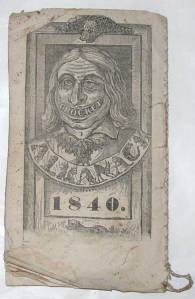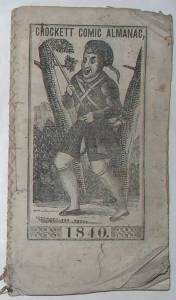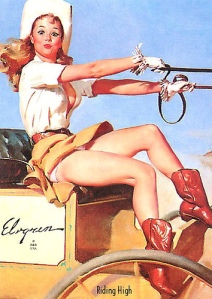 Friends, I’ve been at the beach for a last look at the blue Pacific, packing up, and picking up loose ends of my sabbatical year as we get ready to hitch up the team and head eastward back to our home in the alta sierra. While I’m busy with all this glamour, check out Tom Bredehoft’s latest post on the alt-ac/post-ac life. He’s got a fascinating description of a little mystery he solved regarding a Davey Crockett almanac of 1840:
Friends, I’ve been at the beach for a last look at the blue Pacific, packing up, and picking up loose ends of my sabbatical year as we get ready to hitch up the team and head eastward back to our home in the alta sierra. While I’m busy with all this glamour, check out Tom Bredehoft’s latest post on the alt-ac/post-ac life. He’s got a fascinating description of a little mystery he solved regarding a Davey Crockett almanac of 1840:
The almanacs in this lot, as it turned out, were very much a mixed bag, but the one I immediately spotted as most interesting was titled only “Crockett Comic Almanac 1840.” No author or publisher was given, and there seemed no obvious way to identify even the printer. But I knew that much of Davy Crockett’s reputation as a rough-and-ready frontiersman had been spread and elaborated by a variety of Crockett almanacs dating from the 1830s to the late 1840s, and that those books were very collectible indeed. My almanac was missing one leaf, and someone had snipped out a further joke or two, but it still seemed likely to have some value.
But it wasn’t listed in Drake, the standard bibliographic reference on American almanacs before 1850. A closer look revealed that the first interior page, listing the eclipses for the year, stated that they had been calculated for the longitude of Cincinnati, and it seemed likely that the book had been printed there. Still, I could find no record of any Crockett almanac printed in Cincinnati, and the Morgan online bibliography of early Ohio imprints had no record of such a book either. At last I turned to WorldCat, and was nearly frustrated there, too, but for a buried reference to an almanac with the same title bound in a collection of almanacs from the 1840s in the state library of Ohio. On my next trip to Columbus, I dropped into the library and called for the book, and I was delighted to see that it was the same as my own Crockett almanac. Further, I glanced through the other almanacs bound together with it, and I discovered that type batter on the eclipses page of another Cincinnati almanac enabled me to pin down the printer (and probably the publisher) with certainty. I had learned something.
 I was especially happy to read this post, not just because I’m an early Americanist, but because one of my favorite memories of graduate school was reading Carroll Smith-Rosenberg’s fascinating article on “Davey Crockett as Trickster: Pornography, Liminality, and Symbolic Inversion in Victorian America,” originally published in Journal of Contemporary History 17:2 (1982), 325-50, but also included in her collection Disorderly Conduct: Visions of Gender in Victorian America (1986). (Tom, as a medievalist, takes his post back to the Old English poem Deor, but I’m more confident writing about the 1840s than medieval poetry.)
I was especially happy to read this post, not just because I’m an early Americanist, but because one of my favorite memories of graduate school was reading Carroll Smith-Rosenberg’s fascinating article on “Davey Crockett as Trickster: Pornography, Liminality, and Symbolic Inversion in Victorian America,” originally published in Journal of Contemporary History 17:2 (1982), 325-50, but also included in her collection Disorderly Conduct: Visions of Gender in Victorian America (1986). (Tom, as a medievalist, takes his post back to the Old English poem Deor, but I’m more confident writing about the 1840s than medieval poetry.)
Smith-Rosenberg notes that “the Davey Crockett myths flourished during the same years that fear of youthful masturbation reached its apex–the 1830s through the 1850s,” (331) which were created by members of the eastern urban bourgeoisie to appeal to adolescents and young, unmarried men with stories about a supposed western icon. These almanacs popularized Crockett’s advice as “be always sure you’re right THEN GO AHEAD.” In other words, Crockett’s world was not about restraint or respecting boundaries, it was about self-determination in a sometimes fantastically cruel and violent way.
Smith-Rosenberg argues that “behind the scatology and the humour lay one of the earliest and most paradigmatic myths of the origins of the American bourgeoisie,” 332. Amidst the rise of a new economic order prone to panic and collapse, the Crockett almanacs offered young white men an imagined space free of hectoring mothers or wives and “an outlet for hostility and frustration in the violence of Jingoism and racism, which it defined as the natural characteristics of the young white American male,” 346.
I think we could substitute “Call of Duty” for the “Davey Crockett almanacs” and make the same argument.
The learning, and the sharing of what I have learned, have always been the things I love most about the academic life, and I am happy to say that it is truly part of my life as a bookseller as well. But also, it seems important to state clearly that the rare book trade is often, surprisingly often, a knowledge generating enterprise, not all that different from the academic world. And in these days when graduate schools and graduate programs in English in particular are trying to think how they might help guide students to so-called “alt-ac” careers, the rare book trade is one straightforward place where at least some of the skills of academia (bibliographic reference and description, paleography, knowledge of printers’ habits and practices) are used every day. But museum work, librarianship, and public history or folklore might make equally interesting futures for English graduate students, though it’s the book trade I know best, of course. Academics, it seems to me, need to understand and value all of these other knowledge-generating careers, if they have any hope of effectively communicating to their students that they have value.
. . . . .
Of course I sold my Crockett Almanac: I had put a lot of energy and a lot of hours into learning about it, and I was able to turn my learning into cash money: selling it it literally made my week. I find it odd, sometimes, to recognize that my livelihood is now tied to the whims of the American consumer (and the American consumer of luxury goods, no less!). But then again, isn’t that, also, true of academics as well?
Yes, yes it is: when taxpayers refuse to support our work, then rich donors become that much more powerful and influential. I don’t like it, but then what other institutions can offer refuge from the barbarian invasion we’ve endured for the past forty years? Sometimes you have to wait out the siege in the monastery you have, not the one you wish you had or would like to have. Or, you can strike out on the open road and shift for yourselves as Tom has. Can most of us who still work in universities say that our employment is more secure?
This line from Smith-Rosenberg’s article got me thinking: “While adopting the literary persona of an illiterate frontiersman, the authors of the Davey Crockett almanacs . . . were actually members of the urban bourgeoisie,” 331.
Now why does that sound so darned familiar? You may think you know, but I couldn’t possibly comment. I may post again from the wagon trail back, but no promises. Don’t fence me in!

Hope the wagon train makes its way safely, and the horses are strong!
LikeLike
Herd ’em up and move ’em out! Safe travels.
LikeLike
Damn, damn, damn. I missed my chance to meet up with you out here. Lost track of time buffaloing this crazy semester to the finish line.
Ah well. Have a good journey and a happy arrival at home!
LikeLike
Thanks! And you know that like Ahhhnuld, I’ll be back.
LikeLike
Not just “rich donors” – tuition too. Higher education at a “name” college or university, independent or public, is for most undergraduate students and their families a luxury, as they’re paying for prestige and for extras not available at lower-cost/more convenient alternatives. It’s a true luxury market in that the economic pressures are toward higher prices.
LikeLike
You are correct. This is a great point. Big-spending consumers of “name brands” don’t always want to hear that they need to work harder or better for the results they want.
LikeLike
Eastward ho, Historiann! Having recently reviewed a fun volume of essays on book history, I enjoyed this practical excursion into the same. Some of my fondest memories of grad school were in tracking down cataloguing details for our rare book collection, although nothing ever so intriguing as this Crockett piece.
LikeLike
I learned a whole bunch of “somethings” at some cool foreign archives that I won’t get the chance to just pop back into, the way I might with my friendly locals. That epiphanal movment of seeing something jump out of a dusty folder of old letters that answers a question you hadn’t even thought to ask yet is about the most rewarding thing we get to do (once in a while), and it can happen in or out of academic irons. Have a great and safe trip back “east,” Historiann, and look forward to resumption of postings!
LikeLike